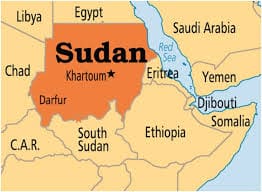Save the Children has issued a stark warning about the worsening humanitarian crisis in Sudan where thousands of children face the dual threats of disease and starvation amid ongoing conflict and severe flooding.
The charity reported a significant spike in cholera cases, particularly impacting children under five, in eastern Sudan as heavy rains exacerbate an already dire situation.
Nearly 2,900 cases of cholera and 112 deaths have been reported across the country between July 22 and early September, with Sudan’s Ministry of Health officially declaring the outbreak on August 12.
However, Save the Children noted that the actual figures are likely higher due to limited access to health facilities and significant underreporting, as indicated by Sudan’s Health Cluster – a partnership of the UN, the Federal Ministry of Health and non-governmental organisations.
In regions such as El Damer in River Nile State and Gedarif in Gedarif State, cholera cases have surged among young children, who account for nearly 15 percent of confirmed cases and related fatalities.
The rapid spread of cholera is fuelled by widespread flooding, contaminated water sources and a severely weakened health system, all of which have been compounded by 16 months of an ongoing armed conflict.
The flooding has already led to the deaths of at least 173 people and injured 505 since June, according to the National Council for Civil Defence.
The collapse of the Arbaat Dam in Red Sea State on August 24 has further exacerbated the crisis, cutting off a vital source of drinking water for the coastal city of Port Sudan, a key humanitarian hub.
The heavy rains have also displaced 4,300 people from camps in North Darfur State, including areas where famine conditions have been declared.
The flooding has destroyed approximately 900 tents and washed away latrines, disrupting vital humanitarian aid efforts.
Save the Children interim country director Mohamed Abdiladif summed up the dire situation when he said Thursday that “children in Sudan have gone from horror to horror.”
“Even before the conflict erupted last year the country was home to one of the world’s biggest humanitarian crises, with existing localised conflicts, natural disasters, disease outbreaks and economic degradation leaving 15.8 million people in need,” Abdiladif said.
He added: “That figure has now escalated to 25.6 million people, and diseases like cholera will only trigger a greater increase.”
The crisis has escalated food scarcity, putting children at heightened risk of malnutrition.
The official said Save the Children is actively working to provide clean water, sanitation facilities and hygiene promotion activities to combat the spread of waterborne diseases.
He bemoaned the ongoing fighting between the Sudanese Armed Forces and the paramilitary Rapid Support Forces, which has claimed tens of thousands of civilian lives and displaced millions since April 2023.
“Conflict is not just about immediate violence but is also a slow but deadly drip-feed of other grave threats to children’s lives such as malnutrition and disease,” Abdiladif said.
With no end in sight to the civil war, Abdiladif warned that urgent funding is needed to deliver adequate treatment for cholera and to support the most vulnerable families in accessing basic necessities.
JN/APA


